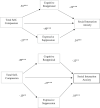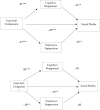Self-compassion and social anxiety: The mediating effect of emotion regulation strategies and the influence of depressed mood
- PMID: 35859529
- PMCID: PMC9796305
- DOI: 10.1111/papt.12417
Self-compassion and social anxiety: The mediating effect of emotion regulation strategies and the influence of depressed mood
Abstract
Objectives: Self-compassion constitutes a positive way of relating towards the self that enables emotional regulation and reduces emotional distress. This research first explored differences among a sample of persons with social anxiety disorder (SAD) and groups of high socially anxious (HSA) and low socially anxious (LSA) students on self-compassion, emotion regulation, and social anxiety. We then investigated emotional regulation as a mediator of the prediction of social anxiety by self-compassion and the influence of depressed mood on those relationships.
Design: Study 1 compared a SAD group to matched groups of HSA and LSA students. Study 2 utilized the total sample (n = 330 students and n = 33 SAD) to test mediation. Self-compassion and emotion regulation were predictors of social anxiety and depression a covariate.
Results: In Study 1, the SAD group did not differ from the HSA group on most aspects of self-compassion and emotional regulation but was higher on depression. Both were lower on most measures and higher on depression than the LSA group. In Study 2, higher self-compassion predicted lower social interaction anxiety, and emotional regulation strategies mediated this effect, regardless of depression. However, for social performance anxiety, controlling for depression removed mediation. Refraining from uncompassionate responses was directly connected to social anxiety, whereas compassionate responses influenced social anxiety via emotional regulation.
Conclusions: Results affirm the ameliorative role of self-compassion on social anxiety and emotion regulation strategies as mechanisms of that influence. However, self-compassion's influence was affected by depression and type of social anxiety. Also, refraining from uncompassionate self-responding appears to be of prime importance in predicting social anxiety, whereas compassionate self-responding influences social anxiety via emotion regulation.
Keywords: attitude to self; depression; emotion regulation; self-compassion; social anxiety.
© 2022 The Authors. Psychology and Psychotherapy: Theory, Research and Practice published by John Wiley & Sons Ltd on behalf of The British Psychological Society.
Conflict of interest statement
All authors report no conflict of interests.
Figures


Similar articles
-
Self-compassion and emotional regulation as predictors of social anxiety.Psychol Psychother. 2021 Sep;94(3):426-442. doi: 10.1111/papt.12318. Epub 2020 Nov 20. Psychol Psychother. 2021. PMID: 33215812
-
Testing the Efficacy of a Brief, Self-Guided Mindfulness Ecological Momentary Intervention on Emotion Regulation and Self-Compassion in Social Anxiety Disorder: Randomized Controlled Trial.JMIR Ment Health. 2024 Apr 19;11:e53712. doi: 10.2196/53712. JMIR Ment Health. 2024. PMID: 38640015 Free PMC article. Clinical Trial.
-
Scared of compassion: Fear of compassion in anxiety, mood, and non-clinical groups.Br J Clin Psychol. 2020 Sep;59(3):354-368. doi: 10.1111/bjc.12250. Epub 2020 May 4. Br J Clin Psychol. 2020. PMID: 32367569
-
On the Edge of Psychopathology: Strong Relations Between Reversed Self-compassion and Symptoms of Anxiety and Depression in Young People.Clin Child Fam Psychol Rev. 2024 Jun;27(2):407-423. doi: 10.1007/s10567-024-00471-w. Epub 2024 Mar 12. Clin Child Fam Psychol Rev. 2024. PMID: 38472504 Free PMC article. Review.
-
Mechanisms of Change in the Relationship between Self-Compassion, Emotion Regulation, and Mental Health: A Systematic Review.Appl Psychol Health Well Being. 2018 Jul;10(2):215-235. doi: 10.1111/aphw.12127. Epub 2018 Apr 19. Appl Psychol Health Well Being. 2018. PMID: 29673093
Cited by
-
Shame-Based Experiences of Homophobic Bullying and Mental Health: The Mediating Role of Self-Compassionate Actions.Int J Environ Res Public Health. 2022 Dec 15;19(24):16866. doi: 10.3390/ijerph192416866. Int J Environ Res Public Health. 2022. PMID: 36554745 Free PMC article.
-
The Mechanisms Underlying the Relationship Between Self-Compassion and Psychological Outcomes in Adult Populations: A Systematic Review.Stress Health. 2025 Aug;41(4):e70090. doi: 10.1002/smi.70090. Stress Health. 2025. PMID: 40719190 Free PMC article.
-
Self-Compassion Across Anxiety and Mood Disorders: Implications for Treatment.Curr Psychiatry Rep. 2025 Feb;27(2):134-139. doi: 10.1007/s11920-024-01582-5. Epub 2024 Dec 27. Curr Psychiatry Rep. 2025. PMID: 39725816 Review.
-
Trait resilience protects against social anxiety in college students through emotion regulation and coping strategies.Sci Rep. 2025 Aug 1;15(1):28143. doi: 10.1038/s41598-025-13674-0. Sci Rep. 2025. PMID: 40751070 Free PMC article.
-
The Mediating Roles of Self-Compassion and Emotion Regulation in the Relationship Between Psychological Resilience and Mental Health Among College Teachers.Psychol Res Behav Manag. 2024 Dec 3;17:4119-4133. doi: 10.2147/PRBM.S491822. eCollection 2024. Psychol Res Behav Manag. 2024. PMID: 39650086 Free PMC article.
References
-
- Adie, T. , Steindl, S. R. , Kirby, J. N. , Kane, R. T. , & Mazzuchelli, T. G. (2021). The relationshipbetween self‐compassion and depressive symptoms: Avoidance and activation as mediators. Mindfulness, 12, 1748–1756. 10.1007/s1267-021-01637-1 - DOI
-
- Akin, A. , & Çetın, B. (2007). The depression anxiety and stress scale (DASS): The study of validity and reliability. Educational Sciences: Theory & Practice, 7(1), 260–268.
-
- American Psychiatric Association . (2022). Diagnostic and statistical manual of mental disorders fifth edition, text revision (DSM‐5‐TR). Author.
Publication types
MeSH terms
LinkOut - more resources
Full Text Sources

